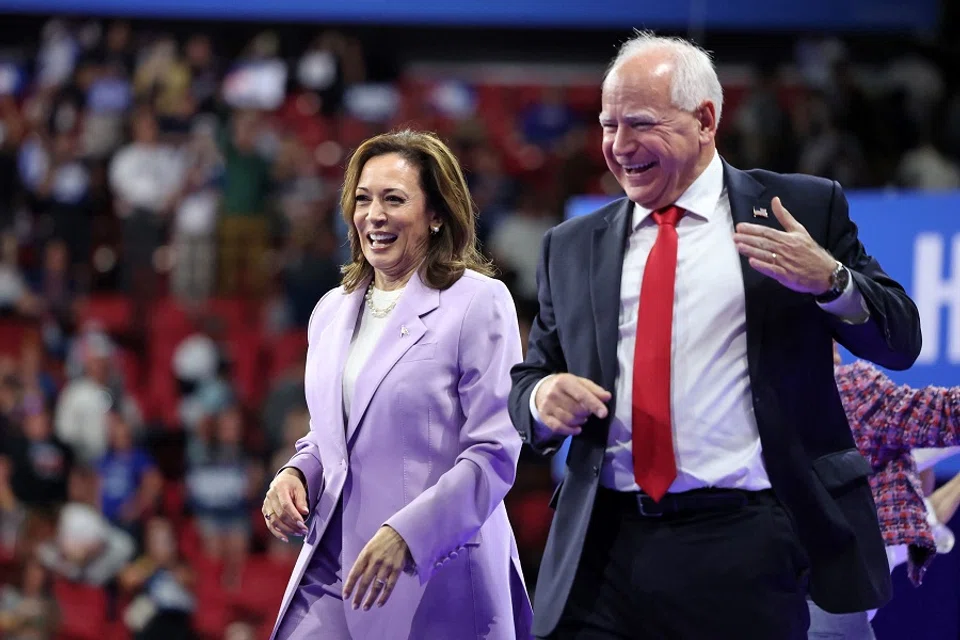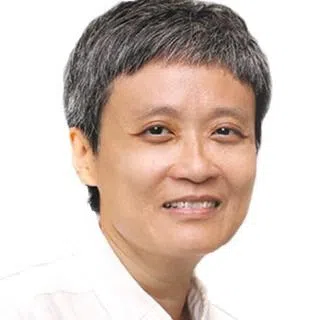What a Harris-Walz victory might mean for US-China relations
Chinese-speaking Tim Walz taught in Guangdong in the 1980s, while Kamala Harris co-sponsored the Hong Kong Human Rights and Democracy Act as a senator. How might US-China relations shift if they win the presidency? Lianhe Zaobao correspondent Sim Tze Wei reports.

On 6 August, US Vice-President Kamala Harris, who won the Democratic nomination for the presidency, officially announced Minnesota governor Tim Walz as her running mate.
Chinese netizens on social media have honed in on Walz’s experience teaching in China.
Limited diplomatic experience
The Chinese-speaking Walz, 60, taught in Foshan, Guangdong, from 1989 to 1990 — a rewarding experience for him, as reported by the Nebraska Star-Herald in 1990. During that time, he visited Macau at least six times and rode a 40-hour train to Beijing. Walz and his wife later set up an educational travel company that organised trips to China for American students.
According to a report by US news website Politico, Walz is no dove when it comes to China. During his time in congress, he met with the Dalai Lama and served on the Congressional-Executive Commission on China, a US government agency responsible for monitoring China’s human rights and rule of law.
Walz’s experience in China predates Xi Jinping’s era, so he is likely quite critical of the governance changes since 2012, especially censorship and the elimination of civil society... — Drew Thompson, visiting senior research fellow, Lee Kuan Yew School of Public Policy, National University of Singapore

Drew Thompson, a visiting senior research fellow at the Lee Kuan Yew School of Public Policy at the National University of Singapore (NUS), told Lianhe Zaobao that Walz’s experience in China predates Xi Jinping’s era, so he is likely quite critical of the governance changes since 2012, especially censorship and the elimination of civil society, among others. These factors would most likely influence his current views on China.
Walz has little experience in diplomacy; similarly, 59-year-old Harris did not have much real experience in diplomacy before becoming vice-president.
Harris’s career has mainly been as a prosecutor and senator. She started working at the Alameda County District Attorney’s Office in California, became the district attorney of San Francisco in 2003, was elected as the attorney general of California in 2010, and became a senator of California in 2017. During her time as a senator, she was a member of the Senate Intelligence Committee, which gave her a crash course in US foreign policy.
After becoming vice-president in 2021, Harris began to take on a more prominent role in diplomacy. She has made 17 overseas visits to seven countries, including four trips to Asia. During these visits, she emphasised the need to curb China’s influence in the region and promote the establishment of a safe and secure Indo-Pacific region.
Although Harris has not yet visited China as vice-president, she has met with President Xi and Premier Li Qiang several times in multilateral settings.
In November 2022, Harris had a brief conversation with Xi at the APEC summit in Thailand. She reiterated President Joe Biden’s hope that the US and China can “maintain open lines of communication to responsibly manage the competition between our countries”.

In September 2023, she had a brief meeting with Chinese Premier Li on the sidelines of the ASEAN summit in Jakarta, Indonesia. After the meeting, Harris told US media that handling US-China relations is not about decoupling but “de-risking”.
She also said, “It’s not about pulling out, but it is about ensuring that we are protecting American interests, and that we are a leader in terms of the rules of the road, as opposed to following others’ rules.”
Harris’s China policy will continue Biden’s policies in a more systematic and comprehensive way, emphasising the “3C” policy of “competition, confrontation and cooperation”, with the cooperation aspect aligning with US interests and wishes. — Zhu Feng, executive dean, School of International Studies, Nanjing University
Possible strategy as president
Academics interviewed believe that if Harris is elected, the new Democratic government’s China policy under Harris will largely follow Biden’s approach, continuing his policies and not differing significantly from former president Donald Trump’s.
Zhu Feng, executive dean of the School of International Studies at Nanjing University, analysed that whether Trump or Harris is in power, the US will continue to strengthen its suppression of China, viewing China as its main competitor, and maintaining US hegemony as the top goal in its national interest, albeit with slightly different focuses.
Zhu assessed that Harris’s China policy will continue Biden’s policies in a more systematic and comprehensive way, emphasising the “3C” policy of “competition, confrontation and cooperation”, with the cooperation aspect aligning with US interests and wishes. Trump will also maintain the 3C policy, but may intensify suppression and confrontation on trade and economic issues.
Dylan Loh, an assistant professor at the Public Policy and Global Affairs division at Nanyang Technological University (NTU) in Singapore, also analysed that compared with Trump’s focus on asserting pressure through trade, Harris will continue Biden’s approach of treating trade as just one aspect of the US’s China policy.
Loh added that Harris’s China policy will largely depend on key appointments such as the secretary of state, defence secretary and national security adviser.

Harris’s current national security adviser is Phil Gordon, who is expected to be a key adviser if she becomes president. Gordon previously served as Middle East adviser to former Democratic President Barack Obama and is a strong supporter of NATO. Harris is expected to strengthen relationships with NATO and US Indo-Pacific allies and partners.
During a visit to the Philippines in 2022, Harris said, “We will continue to rally our allies and partners against unlawful and irresponsible behaviour.” She also stressed that the South China Sea arbitration ruling is legally binding and must be respected.
NUS’s Thompson pointed out that there is a strong consensus in Washington that China represents both an economic challenge and a security threat, affirmed by China’s joint military exercises with Russia close to the US territory of Alaska, as well as China’s military exercise in Belarus close to Ukraine’s border. The next administration will further strengthen controls on dual use technologies, including semiconductors.
Maintaining status quo
As for whether Trump or Harris might put more pressure on China, NTU’s Loh believes that there is not much difference. He said that while Trump is seen as a transactional businessman, the US actually conducted more frequent freedom of navigation operations in the South China Sea during his presidency than during Obama’s.
Nanjing University’s Zhu also believes that whether Harris or Trump is elected, the pressure and difficulties faced by China will not be substantially different.
Even if “America First” Trump takes office, he will continue Biden’s policies to pull allies and partners to counter China from a geopolitical and geo-economic perspective, promote NATO’s eastward expansion, and draw NATO’s attention to the Indo-Pacific and China issues.
... if Harris takes office, the US’s attacks on China’s human rights and freedom issues may intensify, and the ideological war and struggle for discourse between the US and China will continue. — Zhu

On 1 August, US journal Foreign Affairs published an article by Wang Jisi, founding president of the Institute of International and Strategic Studies at Peking University, and two other scholars from Peking University titled “Does China Prefer Harris or Trump?”.
They wrote: “Given the broad similarities of both the Trump and the Biden administrations’ approach to China, Beijing is preparing itself for the outcome of the US elections with great caution and limited hope.”
Ideological war may intensify
As a former prosecutor, Harris is particularly concerned about human rights issues. During her time as a senator, she actively promoted legislation to protect human rights in Hong Kong. In 2019, she and Republican senator Marco Rubio from Florida co-sponsored the Hong Kong Human Rights and Democracy Act. She also co-sponsored and promoted the Uyghur Human Rights Policy Act of 2019 with Rubio, which passed in 2020.
Zhu believes that if Harris takes office, the US’s attacks on China’s human rights and freedom issues may intensify, and the ideological war and struggle for discourse between the US and China will continue.
On the Taiwan issue, Trump recently suggested that Taiwan should pay the US for its defence. Meanwhile, Harris is expected to continue Biden’s Taiwan policy, further strengthening US-Taiwan military cooperation and ensuring that Taiwan has sufficient self-defence capabilities.
NUS’s Thompson said, “The Democratic Party has long championed human rights, with leading Democrat figures taking consistently firm stands on human rights issues related to China, including Xinjiang and Tibet, and they are also committed to the preservation of Taiwan’s democracy.”
He added, “If Vice-President Harris is elected she will most likely continue to follow that policy path and call out Beijing when its policies and practices run counter to liberal international norms.”
This article was first published in Lianhe Zaobao as “哈里斯对华料“拜规哈随” 竞选搭档沃尔兹曾在中国教书”.





![[Photos] Fact versus fiction: The portrayal of WWII anti-Japanese martyrs in Taiwan](https://cassette.sphdigital.com.sg/image/thinkchina/3494f8bd481870f7c65b881fd21a3fd733f573f23232376e39c532a2c7593cbc)